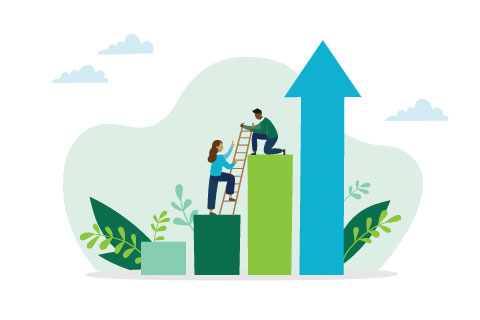This time of year always feels like it’s about renewal as spring starts to show through and, in fiscal terms, we move from one financial year into the next. So the time feels right – and necessary – to redouble efforts to move out of the economic doldrums we have been in and kickstart a new period of growth.
There have been some modestly encouraging signs recently that conditions are improving. The official UK forecast is now that we will avoid technical recession this year. The IMF was more gloomy, predicting a -0.3% contraction in UK GDP in 2023, but this was an improvement on their previous estimate of -0.6%.
Meanwhile, the latest quarterly survey of CFOs by Deloitte saw a bounce in confidence amongst finance directors – the sharpest rise since 2020. CFOs reported an easing of supply chain and recruitment problems, and also expect inflation to fall to around 4% over the coming 12 months.
On the consumer side, the most recent GfK Consumer Confidence Index continued the positive story, as confidence rose for the third consecutive month. All measures were up, including an eight-point improvement in consumers’ expectations of their own personal finances in the next year. This even prompted GfK’s Client Strategy Director Joe Staton to talk of “a sudden flowering of confidence”.
In the balance
But as encouraging as this is, things nevertheless remain finely balanced. The Deloitte survey, for example, found that underneath the surface optimism, CFOs remain highly cautious – taking a “defensive strategy stance” with a heavy focus on cost control and building up cash. While with respect to consumer confidence, we should remember that although it has improved, the overall GfK index score remains firmly in the negative. There is much further to go before we actually reach positive territory.
What we can take from all this, however, is that the ingredients for a recovery are starting to come together. We now need to capitalise on these to build real momentum. And we need to do this in a sustainable way so that it doesn’t prove to be a false start.
Service as an accelerator
One of the key ways we can achieve this is to build on something that really differentiates the UK – and that’s service. I wrote in my last blog about the Institute’s vision of building a Service Nation and how this is fundamental to success, as better service drives higher volumes of business and higher productivity – two critical components for economic growth. Our latest UK Customer Satisfaction Index (UKCSI) uncovered a record high of one in seven customers experiencing a problem with an organisation. As a result, up to 20% of staff time is taken up in dealing with issues. That creates a huge drag on productivity – worth billions to the national economy every month.
Getting service right will prove an economic accelerator in itself, therefore. We can further multiply its positive effect by linking the service agenda to policymaking on skills, training and apprenticeships. This will help embed service as an integral part of the mindset that staff have across a whole spectrum of roles – not merely those in customer contact centres. Anyone whose job touches on the customer, whether that’s the design of products and services, the creation of digital channels and apps, managing a customer-facing team, or leading the development of the customer strategy itself, needs to put service elements at the heart of their approach.
Rising to the global challenge
I believe that we can elevate the UK’s status through truly becoming a Service Nation – and that this will be one of the best ways we can compete on the global stage. I recently went on a short trip to the East and was hugely struck by the competition we’re facing! It’s not just about China. Across countries such as South Korea, Vietnam, India and Singapore, there is a scale of ambition and belief that drives performance forward. There is enormous entrepreneurial spirit and a real can-do mentality. Of course, these countries have challenges and issues of their own, but it felt clear to me that the centre of economic gravity is shifting towards the East, raising the stakes for the UK and other Western economies.
We need to compete and we need to believe in ourselves. Technology, digitisation and innovation are of course absolutely key components for any future roadmap. But alongside that, we need to really drive momentum in creating the Service Nation concept. It can be a key differentiator for us that will bolster performance domestically and internationally.
As spring beds in and confidence starts to increase, we need to seize the opportunity and move the dial.



